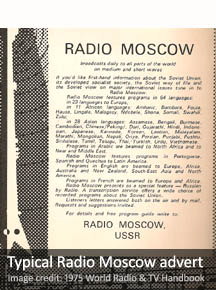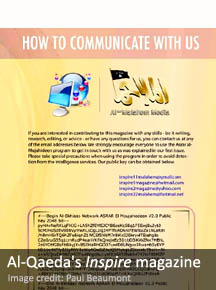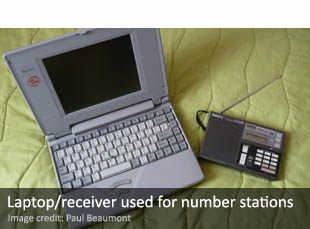Guest Comment: Radio Still Medium of Choice for Many Spies
August 2, 2012 7 Comments
 By PAUL BEAUMONT* | intelNews.org |
By PAUL BEAUMONT* | intelNews.org |
In 1975 whilst the Cold War was still being fought, short wave listeners were treated nightly to whatever stations they chose to listen to from wherever, propagation permitting. These broadcast stations carried a catholic mix of information, political views and insights, propaganda, religious ideology (usually with a political point) and music and other cultural statements of the government of the day. Broadcast stations with good signals were the BBC World Service, Voice of America, and Radio Moscow. But not all was as it seemed. Radio Moscow used very high powers so that those furthest from their transmitters still received signals at good strength whilst the propagation conditions ensured the frequencies were selected for the most efficient transfer of radio programs. One could sit in one’s armchair with no more than a telescopic antenna raised from the radio set and hear news from a foreign station and quickly retuning, could hear the same news but with a totally different bent. Even the music was not what it seemed, especially for two particular British spies, one being Frank Clifton Bossard, an officer with Britain’s Ministry of Defence Missile Guidance Branch, the other John Symonds, an ex-Detective Sergeant wanted in connection with Operation COUNTRYMAN. Bossard was strapped for cash and approached the KGB, whilst finding himself overseas with no funds Symonds found himself working for the KGB as a ‘Romeo Spy’ seducing wives of diplomats for information. Interestingly MI5 denied that Symonds acted as he did and suggested such actions were a figment of John Symonds’ imagination.
The proof came with the publication of the Mitrokhin Archive that gave an excellent account of Mr. Symonds’ activities and whereabouts. Both Bossard and Symonds received their instructions by radio; they simply listened to Radio Moscow at a certain day and time and waited for certain pieces of music to be played to give instruction as to which dead letter box contained a message for them and needed to be cleared. Whether the Voice of America did such acts is unknown, but probable. The BBC broadcast like coded messages to the French Resistance and others during World War II, an example appearing in the blockbuster film, The Longest Day. The BBC also used mention of a concocted news piece on local radio to ensure some compliance of those who had illegally entered the Iranian Embassy but signed their own death warrants when they executed a hostage in 1980.
Tuning the shortwave in those times it was difficult for the listener not to come across a Number Station. Their origins go back to the days of World War I when current transmitters and receivers sent signals through the earth. Whenever signals were sent, someone was listening and the massive loss of life caused by this practice dictated the use of complicated codes on both sides.
The prevalence of number stations in the Cold War years was high, on one frequency you would hear a tinny female voice barking out German numerals in a cold and threatening manner. The British sent them, the East German Stasi sent them and the Soviet KGB sent them. Others sent them too as well as Israel and America; in fact it is only recently that signals from British, American and Israeli transmitters ceased; but this does not mean the Security machinery of these countries remains quiet on the message front.
Whilst these stations are universally known as number stations, the CIA referred to them as OWVC, the One Way Voice Channel. Readers may be surprised to learn OWVCs were employed to send instructions to agents in deep cover in North Vietnam during the Second Indochina War —commonly known in the West as the Vietnam War. Again, the political nature of Broadcast stations remit was to be seen from the Voice of  America and Radio Peking when the American forces withdrew from Vietnam. The Voice of America described an orderly, if not frantic withdrawal within a time limit but Peking, obviously briefed from Saigon, painted a picture of Americans fleeing with their tails between their legs. The BBC World service, famed for its fair and balanced news coverage, merely reported that America was withdrawing from Saigon.
America and Radio Peking when the American forces withdrew from Vietnam. The Voice of America described an orderly, if not frantic withdrawal within a time limit but Peking, obviously briefed from Saigon, painted a picture of Americans fleeing with their tails between their legs. The BBC World service, famed for its fair and balanced news coverage, merely reported that America was withdrawing from Saigon.
In 2012, and thanks to the technical advances, many due to many facets of the Cold War, advances in missiles and space research and the almost exponential advances with electronics, we now enjoy other ways of communicating with each other, notables being the cellphone, satphone, the personal computer and of course the Internet. The integration of this mobile telephone technology with the Internet is also a massive advancement.
Despite this miniaturization of technology, nations still use number stations to reach their agents abroad. The way in which these stations prepare and send their messages is anything but simple; schedules need to be prepared that are personal to the agent taking their free time from personal activities as well as being strong enough to be heard.
It would seem that the internet was ripe for such use; but it isn’t. For instance, Insipire the English-language magazine of al-Qaeda suggests a communication system for interested parties to contact them with a bespoke program which looks like a PGP key although the algorithms may be stronger and the language different. The author who wrote the piece was not so sure of the program’s resilience against penetration by the likes of NSA and GCHQ agencies so he warned users to observe some caution in the words they use; “Please take special precautions when using the  program in order to avoid detection from the intelligence services”.
program in order to avoid detection from the intelligence services”.
The computer does have uses by the agent at large. Ana Belen Montes used one to decode her number station messages from the Cuban DGI. The fact she didn’t bother to wipe the hard disk drive provided damning evidence. It is known that 11 Russian illegals arrested in 2010 used the Asus EEE notebooks to communicate amongst themselves using its WiFi capability as well as decoding their number station message. Their messages, like those received by two spies arrested in Germany in October 2011, used ‘Radiogramma’, a series of tones having a numeric and program administrative value. The bespoke program would decode the message directly into a readable message, probably with a password to allow the user to read the product.
One Cuban spy, Kendall Myers, received number station messages by Morse. The Morse used by the DGI for agent messages consists of cut numbers T A N D U W R I G M short for 0 to 9. Indeed the message I intercepted today on 5898kHz 0505UTC had the first three groups, its header, as: WIUWN RGAGN GNWNA or when reduced to numerics: 57452 68182 82521. To tell if a message is valid the figure 9 [M] is used in the first groups of each message, of which there are three. Myers made his reply via the internet in email form. It is not known if that led to his downfall but I suspect his messages were being routinely read by the agency charged with gaining evidence against him.
It is generally known that messages sent via the internet can be traced; many private users do that in a rudimentary manner using a free system exploiting certain WHOIS sites. Al-Qaeda suggest their supporters take special precautions but they also suggest elsewhere moving to different sites to send their messages to avoid the trace.
The number stations persist, not in the concentration of the Cold War years, but they are there. The convenience is as obvious as is the security. No agent will have a massive antenna in his or her garden, instead a modern receiver will be present and the agent will just tune in. They might connect a computer to the radio, but that’s it — how do you trace it? There is no technical backwardness here whatsoever, just method.

Spectral Image of ‘Radiogramma’ transmission as received by Russian illegals and German spy ring
There is another way messages can be sent; the BGAN or Broadband Global Area Network can access the internet via satellite. There have already been two arrests where the BGAN was present; one in Cuba where an American was accused of illegally importing communication equipment, believed to have been disguised as surf boards for use by Jewish groups. The other arrest was in the Lebanon of men believed to be working for Israel’s Mossad, the BGAN hidden in the lid of a water cooler. Tracing messages sent in this manner would be very difficult and would rely on assistance from those who lease transponders; that help may not be forthcoming, if at all.
To send a radio message is a financially expensive thing to do, the immediate and ongoing downsizing of international broadcast stations continues; the BBC World Service is a smidgeon of what it used to be, the Voice of Russia that replaced Radio Moscow has reduced shortwave coverage and the Voice of America also seems to have shrunk.
However, I listen to Voice of Russia on my local digital radio multiplex, London 2. If I want, I can listen on the Internet to whatever international station I wish; it’s not the same though. No interference, no fading, no whistles and no struggle to find it due to an unexpected frequency change. Sadly it is all about saving money whilst reducing program content and languages available despite the available technology to make it cost effective. The number station seems immune from this cost cutting, suggesting that radio is still the tool of choice for covert operatives the world over.
 * Paul Beaumont was born in England and grew up in the Crown Colony of Aden (now South Yemen). His formal education was pursued at the Bromley Technical College and doubtless driven by his interest in electronics and radio. Having pursued a career designing electronic teaching aids and other instrumentation he is now employed as a Physics Teaching Technician at a London University. Paul’s spare time interests are Amateur Radio and Intelligence Matters into which his ongoing activity of the automatic and manual interception of Number Stations is a positive motivator. Paul writes for Eye Spy magazine on Intelligence at large, had his own column Atencion Uno Dos Tres in the now closed UK publication Monitoring Monthly, and has had occasional articles published in Practical Wireless, The Short Wave Magazine and more recently, Radio User. In addition to this Paul was interviewed for a radio programme concerning the existence of Television Detector vans for BBC’s Radio Four. Paul is well traveled having visited a plethora of countries, Australia, Yemen, Guyana, Sudan, Hong Kong and New Zealand to name a few. Sixty two years of age, he has been married for 35 years, has three children and one grandchild and intends to spend even more time with his family on retirement.
* Paul Beaumont was born in England and grew up in the Crown Colony of Aden (now South Yemen). His formal education was pursued at the Bromley Technical College and doubtless driven by his interest in electronics and radio. Having pursued a career designing electronic teaching aids and other instrumentation he is now employed as a Physics Teaching Technician at a London University. Paul’s spare time interests are Amateur Radio and Intelligence Matters into which his ongoing activity of the automatic and manual interception of Number Stations is a positive motivator. Paul writes for Eye Spy magazine on Intelligence at large, had his own column Atencion Uno Dos Tres in the now closed UK publication Monitoring Monthly, and has had occasional articles published in Practical Wireless, The Short Wave Magazine and more recently, Radio User. In addition to this Paul was interviewed for a radio programme concerning the existence of Television Detector vans for BBC’s Radio Four. Paul is well traveled having visited a plethora of countries, Australia, Yemen, Guyana, Sudan, Hong Kong and New Zealand to name a few. Sixty two years of age, he has been married for 35 years, has three children and one grandchild and intends to spend even more time with his family on retirement.







Excellent aritcle Paul. Most informative.
I note that Russian vessels operating in the Southern Ocean still adhere to ‘Radio Scheds’
for pre arranged daily communications – I assume these are via Short Wave Radio ??
Or maybe VLF ?? (Can you intercept VLF communications?)
I do not actively follow Maritime schedules but I am aware of Russia having a maritime service utilising the short wave. VLF interception is possible, local noise and interference permitting.
Paul: nice work as ever.
Kind regards
Daniel/AR
Thanks Daniel.
VLF can be intercepted and done so with an antenna, a long loop of wire attached to the sound card or input of the computer and special software can be gotten from the Internet for free to listen to this traffic. But mostly LORAN and OMEGA type broadcasts.
Excellent aritcle Paul. Thank you for the information.
David Dafinoiu,
AGT Intelligence
Thank you David,
Glad the piece was helpful
Paul